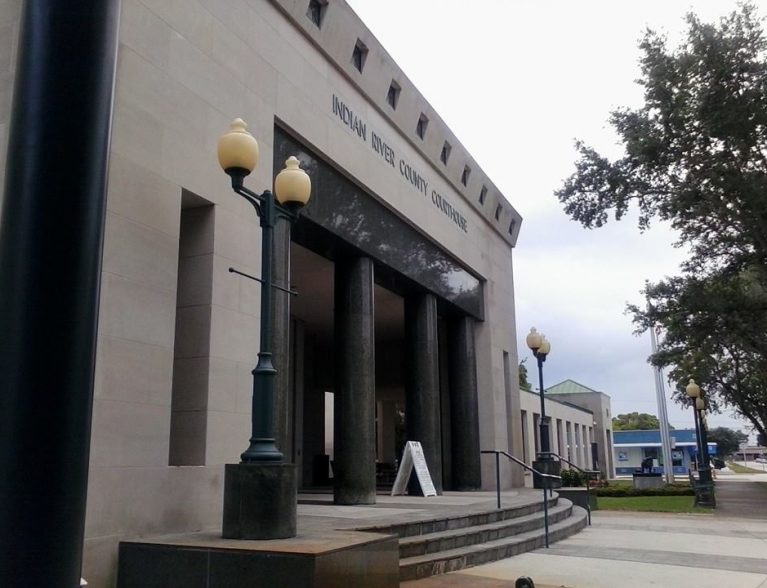
If you go to the Indian River County Courthouse when it reopens Monday, you’ll see plenty of signs warning you to not enter the building if you’ve been advised by health officials to remain quarantined because of exposure to COVID-19.
To get past the deputies at the entryway, in fact, you’ll need to have your temperature taken and fill out a coronavirus-related questionnaire to prove you don’t have a fever and haven’t knowingly put yourself at risk of being infected.
Once you get in, you must wear a mask, so bring one or a disposable face covering will be provided. You’ll also be required to practice social distancing, to the extent possible, by staying at least 6 feet away from other people. The use of hand sanitizer is encouraged and will be available at stations throughout the courthouse.
It’s all part of the courthouse-reopening protocols issued this month by the chief judge of the four-county circuit that includes Indian River.
“We’re dealing with something that’s unprecedented in our lifetimes, so there’s no manual for this,” 19th Judicial Circuit Chief Judge Lawrence Mirman said of the COVID-19 pandemic. “We’re all trying to preserve constitutional rights and, at the same time, prevent the spread of the virus and keep people healthy.
“It’s a daunting task, reopening courthouses during a pandemic,” he added. “We’ll see how it unfolds.”
Local courthouses have been closed since mid-March, creating a backlog in both criminal and civil cases, despite the efforts by judges and attorneys to conduct hearings using Zoom and other video-conferencing systems.
Florida Supreme Court Chief Justice Charles Canady has suspended jury trials in the state until July 2, but Mirman said he wouldn’t be surprised if the suspension is extended.
As for hearings here, Mirman said criminal and family court cases will take precedence over civil court cases – at least initially – in terms of scheduling.
The protocols in Mirman’s order were based on recommendations made by a special panel consisting of Chief Assistant State Attorney Tom Bakkedahl, Indian River County Judge David Morgan, and representatives from the Public Defender’s Office, sheriff’s offices, clerks of court and county administration.
Though he’s reopening the circuit’s courthouses, Mirman’s order directs judges to continue handling as many hearings as possible via video-conference “to limit the number of in-person court appearances and thereby reduce the risks of COVID-19 exposure to all persons involved in court proceedings.”
According to Mirman’s order, you will not be allowed to enter the courthouse if your body temperature exceeds 100.4 degrees Fahrenheit. You must also complete a questionnaire that asks if you been diagnosed with COVID-19, are waiting for test results, or have a cough, fever, shortness of breath, or other symptoms of COVID-19.
The form also asks if you recently had close contact with someone who has COVID-19, or recently traveled from somewhere outside the United States or returned from a trip on a cruise ship.
If you answer “yes” to any of those questions, you may not be permitted to enter the courthouse.
Mirman’s protocols mandate the continued cleaning of courthouses, as recommended by local health officials. They also require bailiffs and other court personnel to “frequently and routinely” sanitize – using disinfectant wipes and solutions approved by the Centers for Disease Control – work stations, door handles, handrails, elevator buttons, and access-key pads and other oft-touched areas.
In addition, Mirman’s order states, court personnel must avoid physically handling documents to the “maximum extent possible.”
Individual judges will maintain traditional control of courtroom proceedings, including regulating how many people may be in the room and where they may sit or stand, “keeping in mind the goal is reduction of disease transmission,” Mirman wrote.
Regarding inmates, Mirman’s order “strongly discouraged” their transport from jail to court in an effort to diminish the virus’ spread among the imprisoned. However, if judges deem it necessary to bring inmates to court, the inmates must be masked.
“Each judge has control over his courtroom, and we’ll address the challenges as they present themselves,” Mirman said. “We know some accommodations will need to be made to make this work.”
One such accommodation, he said, would be allowing brief pauses during hearings so attorneys could confidentially confer with their clients. Usually, they sit side by side, but the social-distancing mandate may not permit it.
“Most of our judges are being cautious already, but we’re all itching to do our work,” Mirman said. “Our caseloads are backing up, and there are no easy answers. We just need to remember we’re all in this together.”



